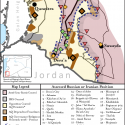 |
 |
Warning Update: Pro-Assad Coalition Set to Escalate in Southern Syria

By Christopher Kozak
Key Takeaway: Syrian President Bashar al-Assad and his allies in Russia and Iran are preparing to launch imminent combat operations in violation of the de-escalation zone in southern Syria. Al Qaeda is also likely preparing for a return of hostilities to southern Syria. The end of the ceasefire would generate new military and humanitarian crises on the borders of Jordan and Israel. The resumption of violence would also present an opportunity – if not counteracted – for further consolidation by Iran and Al Qaeda in southern Syria. The U.S. and its allies must set conditions to transform the inevitable collapse of its flawed truce into an opportunity to advance its interests against Iran, ISIS, and Al Qaeda in southern Syria.
Syrian President Bashar al-Assad and his allies in Russia and Iran are preparing to launch imminent combat operations in violation of the de-escalation zone in southern Syria brokered by the U.S., Russia, and Jordan in July 2017. Pro-regime officials reportedly threatened during a meeting with a local opposition council on January 17 that the de-escalation zone will expire on February 7. In addition, pro-regime forces increased shelling on opposition-held areas and deployed reinforcements to both Dera’a City and Izra in Dera’a Province beginning in December 2017. The reinforcements reportedly included pro-regime militias affiliated with Lebanese Hezbollah and the Iranian Islamic Revolutionary Guard Corps. These deployments further strain a tenuous exclusionary zone brokered in November 2017 that called for the withdrawal of all foreign fighters from frontlines in southern Syria.
Pro-regime forces have already violated the margins of the de-escalation zone in southern Syria. The Syrian Arab Army conducted a military offensive that ended with the forced evacuation of several hundred opposition fighters and civilians from the Beit Jinn Pocket in southern Syria on January 2. The operation reportedly included the quiet participation of local militias backed by Iran and Lebanese Hezbollah. The Beit Jinn Pocket falls within the bounds of the de-escalation zone. Pro-regime forces more recently demanded the evacuation of the besieged opposition-held town of Sanamayn in Dera’a Province on January 22. Sanamayn – which holds a long-standing reconciliation agreement with the regime – rests along the key M5 Highway between Damascus and Dera’a City.
Al Qaeda is also likely preparing for a return of hostilities to southern Syria. Al Qaeda’s Syria affiliate Hay’at Tahrir al Sham (HTS) intends to develop and consolidate a new safe haven in opposition-held southern Syria. HTS reportedly transferred more than 30 senior officials to Dera’a Province to reinvigorate its military and political campaigns in southern Syria in May 2017. HTS intensified its ongoing assassination campaign targeting mainstream opposition figures across Dera’a and Quneitra Provinces in late 2017. HTS also leveraged its mounting influence to muster a temporarily successful opposition offensive against pro-regime forces near the Beit Jinn Pocket in November 2017. This influence only stands to grow as mainstream opposition forces struggle with a cutoff in covert support from the U.S. and Jordan that took effect in December 2017. HTS further bolstered its footprint in southern Syria by transferring at least 100 fighters to Dera’a and Quneitra Provinces from the evacuated Beit Jinn Pocket in January 2018.
The collapse of the ceasefire in southern Syria would apply significant pressure on the U.S. as well as its allies in Jordan and Israel. The de-escalation zone has failed to constrain both Iran and Al Qaeda despite an overall decrease in violence in southern Syria. The resumption of hostilities would nonetheless generate new military and humanitarian crises along the Golan Heights and the Syrian-Jordanian Border. The violence would also present an opportunity – if not counteracted – for further consolidation by Iran and Al Qaeda in southern Syria. Israeli Prime Minister Benjamin Netanyahu likely discussed these challenges in talks with Russian President Vladimir Putin in Moscow on January 29. The U.S. must not be taken by surprise by the collapse of its flawed truce but rather set conditions to minimize further risk to our interests and allies in southern Syria.